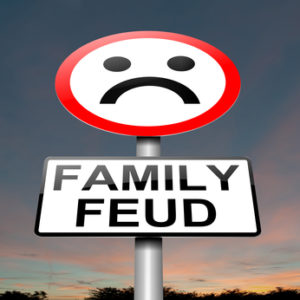
“Happy families are all alike; every unhappy family is unhappy in its own way,” begins Tolstoy’s Anna Karenina.
I think Tolstoy meant that unhappy family memories are uniquely your own. Even though decades may have passed, these memories can resist the effects of time. Interactions with family can reinforce unhappy memories, making it feel like nothing has changed; siblings, parents, aunts, or uncles can seem stuck in the same miscommunication, passive aggressive behavior, or emotional bullying you so disliked years ago. Richard Wilhelm’s story of the Chinese Rainmaker provides a metaphor for how a stuck emotional system like this can be resolved. There are many challenges to finding a sense of peace with your family, but the biggest challenge may be the closest to home. [Note: This article does not address family relationships for those who have experienced physical, emotional, or sexual abuse.]Families are emotionally connected systems geared towards survival (not fairness, unequivocal understanding, or complete acceptance). When faced with challenges, family members adjust to absorb stress. A family can react to change a bit like a mobile hanging from the ceiling—as soon as one element changes, others adjust to rebalance the system. This is why your ideas about how your family needs to change may only serve as a signal for other family members to rebalance, and they may then see you as the problem (hte unbalancer). Families maintain emotional balancing through spoken and unspoken (and often unconscious) rules, punishments, rewards, and taboos. Ideally, a family has some structural boundaries but is also open to learning and, with some effort, can change. When families are too rigid, though, they resist any change. Dysfunction can result. People who experience such dysfunction can feel that the only thing they can do is to cut-off emotionally (Murray Bowen).
Both too much distance and too much closeness can lead to high levels of anxiety and dysfunction in families. While seemingly a good short-term strategy, emotionally cutting off from your family can perpetuate the very patterns you are trying to get free from. For example, you may need to use the same rigidity, emotional aloofness, or severity that you felt you were subjected to in order to cut-off. And, cut-offs do not encourage families to change. Instead, families can see the cut-off person as the problem and increase the very behavior you want nothing to do with. It can feel like you are unable to stay and unable to leave your family of origin; what then is the way out of this conundrum?
Carl Jung related the story of the Rainmaker, as told to him by his friend the sinologist Richard Wilhem. While in China, Wilhelm witnessed a great drought. A rainmaker was eventually summoned from a far away province. After some days a very old and very small man arrived. He requested a quiet house and secluded himself there for three days. On the fourth day, clouds gathered and there was a great snowstorm. Wilhem asked, “How did you make it snow?” The rainmaker replied, “I did not make the snow, I am not responsible.” “What have you been doing these three days?” Wilhem asked. “Oh, I can tell you that,” the rainmaker replied, “I come from another country where things are in order. Here they are out of order, they are not as they should be . . . I am also not in the natural order of things because I am in a discorded country. So I had to wait three days until I was back in Tao, and then naturally the rain came” (Jung, C. G. Mysterium Coniunctionis (1976), in The Collected Works of C. G. Jung, Vol 14 (2nd ed. Trans R. F. C. Hull, pp. 419-420). Princeton: Princeton University Press).
Expecting our surroundings to change is not the way to resolve an emotionally stuck situation. The Rainmaker teaches that we see the world differently if we first put ourselves in order. For the ancient Chinese, this was embodied in the concept of the Tao, the natural flow of life. Jung commented on the rainmaker story, “When someone tells me that in his surroundings the wrong things always happen, I say: It is you who are wrong, you are not in Tao; if you were in Tao, you would feel that things are as they have to be” (p. 420). This idea translates well into dealing with families.
At the end of Tolstoy’s Anna Karenina, one of the main characters, Levin, realizes he had been hoping for everyone else to change and see things his way. His wife and her family were the problem. He has an epiphany when he realizes that things are as they should be. When he places himself within the natural order of life he is able to see others differently, still troublesome, but his new family is not the irresolvable dilemma he once thought.
This way of being idea is misconstrued as resignation to one’s fate (or karma), acceptance of a subpar destiny. The words “resignation” and “acceptance” betray that it is the underlying thought process itself which is out of the natural order. The world as it is has no judgments, it simply is. Seeing that one’s family is as it is means giving up the need or hope that the world (and family) will conform to our expectations. Realizing this does not mean that personality quirks or communication problems disappear. Instead, the Rainmaker shows that we better experience the natural flow of life when we avoid staking our entire sense of wellbeing on our own limited views of things. Then, like the Rainmaker, when things do go well in our life and relationships, it is not because of our efforts but because we are not imposing our efforts. And, by not colluding with our need for things to be a certain way, we are open to opportunities for snow in July.
